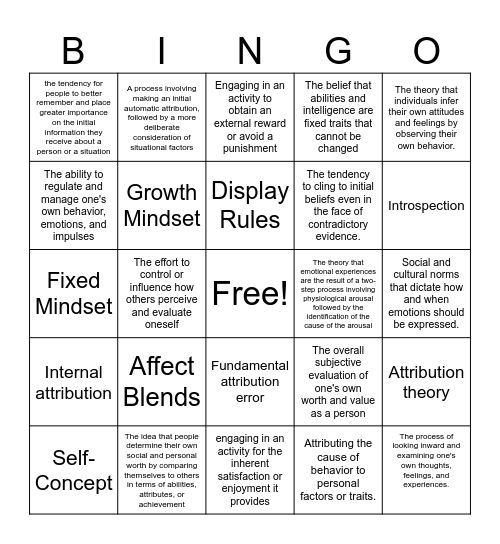

This bingo card has a free space and 49 words: Communication through gestures, facial expressions, body language, The tendency to overestimate the influence of internal factors and underestimate the influence of external factors when evaluating others' behavior., Attributing the cause of behavior to situational or environmental factors., Attributing the cause of behavior to personal factors or traits., Social and cultural norms that dictate how and when emotions should be expressed., Facial expressions that involve a combination of two or more basic emotions., A process involving making an initial automatic attribution, followed by a more deliberate consideration of situational factors, The study of how people interpret and make sense of the causes of behavior., The tendency to cling to initial beliefs even in the face of contradictory evidence., The overall perception and evaluation of oneself; the beliefs and feelings one has about their own abilities and characteristics., The ability to regulate and manage one's own behavior, emotions, and impulses, The effort to control or influence how others perceive and evaluate oneself, The overall subjective evaluation of one's own worth and value as a person, The process of looking inward and examining one's own thoughts, feelings, and experiences., The idea that people become more self-conscious and self-evaluative when they focus their attention inwardly, The tendency to focus on the most noticeable or prominent information when making judgments about others, Engaging in an activity to obtain an external reward or avoid a punishment, The theory that emotional experiences are the result of a two-step process involving physiological arousal followed by the identification of the cause of the arousal, The belief that abilities and intelligence can be developed through effort and learning, the tendency for people to better remember and place greater importance on the initial information they receive about a person or a situation, The idea that people determine their own social and personal worth by comparing themselves to others in terms of abilities, attributes, or achievement, engaging in an activity for the inherent satisfaction or enjoyment it provides, The belief that abilities and intelligence are fixed traits that cannot be changed, The theory that individuals infer their own attitudes and feelings by observing their own behavior., Nonverbal Communication, Affect Blends, Display Rules, Belief Perseverance, Attribution theory, Internal attribution, External attribution, Fundamental attribution error, Perceptual salience, Two-step attribution process, Self-Concept, Self-Control, Free, Self-Esteem, Introspection, Self-Awareness Theory, Self-Perception Theory, Two-Factor Theory of Emotion, Intrinsic Motivation, Extrinsic Motivation, Fixed Mindset, Growth Mindset, Social Comparison Theory, Primacy Effect and Impression Management.
Unit 4 Psychology Review | Social Cognition Bingo | Social Cognition Bingo | Exam 3 | Social Psychology
Share this URL with your players:
For more control of your online game, create a clone of this card first.
Learn how to conduct a bingo game.
With players vying for a you'll have to call about __ items before someone wins. There's a __% chance that a lucky player would win after calling __ items.
Tip: If you want your game to last longer (on average), add more unique words/images to it.